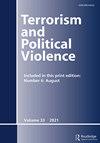Sources of Conventional and Guerrilla Strategies in Ethno-Territorial Civil Wars
IF 2.1
2区 社会学
Q1 INTERNATIONAL RELATIONS
引用次数: 0
Abstract
ABSTRACT In ethno-territorial civil wars, which factors influence whether rebels choose and retain conventional warfare as their primary military strategy throughout the conflict, or whether they use guerrilla warfare as a primary strategy during periods judged to be less advantageous to conventional warfare? The existing literature almost exclusively emphasizes relative power as the determining factor: rebels use guerrilla warfare because they typically lack the capability to fight conventional wars effectively against states. I find some support for this hypothesis: ethno-territorial rebels are much more likely to fight exclusively conventional wars when external states intervene conventionally on the rebel side. I also find that rebel leaders with more intense, far-reaching nationalist goals are more likely to employ guerrilla warfare as a primary war strategy. For such leaders, the higher costs of using guerrilla methods pending an eventual transition to conventional warfare are made more acceptable by a higher valuation of the far-reaching gains delivered by military victory—gains expected to be made more likely by interim periods in which guerrilla warfare is the primary strategy. Turning to other factors, I do not find that status quo conditions or a high level of state democracy have a significant influence.民族-领土内战中常规战略和游击战略的来源
摘要在民族-领土内战中,哪些因素会影响叛军在整个冲突期间是否选择并保留常规战争作为其主要军事战略,或者在被认为不太利于常规战争的时期是否使用游击战作为主要战略?现有文献几乎完全强调相对权力是决定因素:反叛分子使用游击战,因为他们通常缺乏有效对抗国家的常规战争的能力。我发现这一假设得到了一些支持:当外部国家以常规方式干预叛军时,民族领土叛军更有可能只打常规战争。我还发现,具有更强烈、更深远民族主义目标的反叛领导人更有可能将游击战作为主要战争战略。对于这些领导人来说,在最终过渡到常规战争之前,使用游击战方法的成本更高,这是因为对军事胜利带来的深远收益的评估更高,而游击战是主要战略的过渡时期预计更有可能取得这些收益。谈到其他因素,我不认为现状条件或高水平的国家民主有重大影响。
本文章由计算机程序翻译,如有差异,请以英文原文为准。
求助全文
约1分钟内获得全文
求助全文
来源期刊

Terrorism and Political Violence
Multiple-
CiteScore
5.60
自引率
8.30%
发文量
87
期刊介绍:
Terrorism and Political Violence advances scholarship on a broad range of issues associated with terrorism and political violence, including subjects such as: the political meaning of terrorist activity, violence by rebels and by states, the links between political violence and organized crime, protest, rebellion, revolution, the influence of social networks, and the impact on human rights. The journal draws upon many disciplines and theoretical perspectives as well as comparative approaches to provide some of the most groundbreaking work in a field that has hitherto lacked rigour. Terrorism and Political Violence features symposia and edited volumes to cover an important topic in depth. Subjects have included: terrorism and public policy; religion and violence; political parties and terrorism; technology and terrorism; and right-wing terrorism. The journal is essential reading for all academics, decision-makers, and security specialists concerned with understanding political violence.
 求助内容:
求助内容: 应助结果提醒方式:
应助结果提醒方式:


